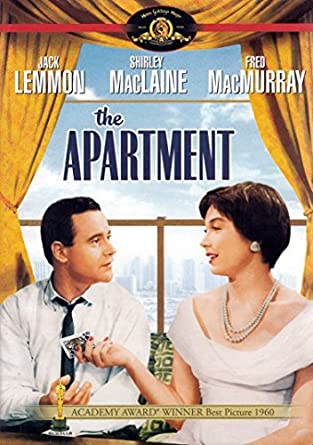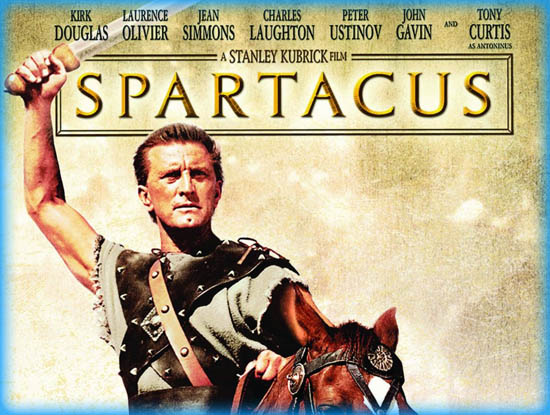1960
See this is what I was talking about last page. The audience is still hungry for slave-vs-Roman epics, but the Oscars went as far from that as they could get. Well, sure, someone was being ill-treated by his employers, you could make that thematic link, similar to how the podcast The Connect linked The Martian and The Purge on the theme of “It’s dangerous outside.” That said, our two films for this year might as well be Marty and Ben-Hur, only a lighter, zippier Marty and a less aggressively Christian Ben-Hur.
And The Oscar Goes To…
Billy Wilder’s back, and he’s much less of a drag than he was with The Lost Weekend, and lighter than Sunset Boulevard. It helps that this one isn’t being narrated by a guy that we’ve just seen dies at the end.
C.C. Baxter (Jack Lemmon) is a bachelor working a desk in a large insurance company, whose quiet, lonely life has one major complication: a quartet of middle managers like to borrow his apartment to hook up with their mistresses in exchange for promises of potential promotions (including Picket Fences’ Ray Walston, who was just in South Pacific, and still doesn’t look younger than he did in the 90s but is even hornier, and that’s weird for me). He also has a crush on elevator operator Fran Kubelik (Shirley MacLaine). Baxter finally gets his promotion when an upper manager named Sheldrake asks to get in on using Baxter’s apartment… but is using it to meet up with Ms. Kubelik. So you might think “that’s the movie,” right? A few wacky misunderstandings, some comic hijinks, Baxter and Kubelik realize they each deserve better, cut to “The End” because end credits still aren’t a thing?
No! The hijinks are mostly in the first half, and then Kubelik’s revelation that falling for a married man is a losing proposition has… darker consequences than I expected, including half a bottle of Baxter’s sleeping pills. Don’t worry, he gets home in time, she recovers, and the thing is, despite the dark turn it’s still funny in the second half. Wilder handles this sudden shift in Baxter and Kubelik’s relationship seriously and honestly but doesn’t lose the wit as the situation shifts. It’s still light and fun but capable of stabbing you in the heart, thanks mostly to great performances from Lemmon and MacLaine, as well as a strong script.
This one was a bit of a delight. Good start to a new decade.
And Rotten Tomatoes Says: They place it at #36, right above Mutiny on the Bounty and just out of the top third. Under The Lost Weekend, though? Hard disagree there. Also I have just now become aware that the RT list has 93 films instead of 92 because they include 1927’s Sunrise: A Song of Two Humans. See, in 1929, when the Oscars began (covering films from ’27 and ’28), there was “Outstanding Picture,” which went to Wings, and “Unique and Artistic Picture,” which went to Sunrise, and sure that second one sounds better, “Unique and Artistic” should have stayed the criteria, but since the Academy dropped that category a year later nobody else thinks Sunrise counts, so neither do I. Also I’m not going back in time to the 20s, we’ve come too far.
What’s Good, Hays Code? There is so much adultery happening in this movie. And the consequences of said adultery aren’t limited to “too little poison.” But honestly it’s probably just the first thing they’d object to.
Okay, let’s keep this 1960 train going, what else do you–
The Box Office Champ
[Sigh] But… but I just… Another? Already? Aw man… do I haveta… well, it is… it is a Kubrick. Shouldn’t skip a Stanley Kubrick. Might be the only one on the list. And it inspired one of the horniest shows on the Starz network, so fine. Spartacus. Let’s do this.
It’s certainly the least religious of the sword-and-sandal crowd so far, not biblical at all. Well, it does claim Christianity “was destined to overthrow the pagan tyranny of Rome and bring about a new society,” which… show your work on that, Spartacus, I’m not sure that’s how it went down at all. But anyway, the point is that nobody needs to stare at the distant, blurry figure of Jesus to think “Hang on, maybe slavery isn’t great,” it’s just inherently bad, and the opening narration also has our first, if subtle, statement that when they say “Slavery was cruel and wrong,” they also mean you, America, so that’s good.
A willful and disobedient slave named Spartacus (Kirk Douglas, already looking a little aged-leathery) is sold to a trainer of gladiators, Batiatus (Peter Ustinov, more restrained than he was in Quo Vadis but still good). Batiatus’ chief trainer is a dick to Spartacus, and we learn why you shouldn’t be a dick to slaves you train as lethal warriors, because eventually Spartacus hits back and the gladiators pretty easily fight to freedom. Spartacus builds a slave army and attempts to fight and pillage their way out of Italy, but a schemer named Marcus Licinius Crassus (Sir Laurence Olivier, and yes by the look of him it has been 20 years since Rebecca) sees this as an opportunity to turn Rome from republic to empire, and uses Spartacus’ defeat to put himself on top… along with two pals, Pompey and Julius Caesar. Yeah, this little triumvirate or rulers didn’t work out long-term.
And the problem is, of course, that when Spartacus is finally defeated (but not identified by his captors thanks to the famous “I am Spartacus” scene) there’s still at least 30 minutes of movie left. These things don’t have to be over three hours, people, and you don’t need to make us wallow in the hero’s defeat for the length of a CSI episode.
If I’m being honest I also don’t see much of Kubrick’s visual style in this one. It’s better made than Ben-Hur or Ten Commandments… I shouldn’t need to list the others… but still feels mostly the same. More filming on location, fewer or at least better green screens, but just a better version of the same aesthetic. Maybe because Kubrick came to the project late, after Kirk Douglas fired the first director and brought Kubrick in to replace him. From the stories, this one was Douglas’ baby first and foremost, so I can understand Kubrick not making big swings.
Best cast and best performances of the whole genre, though. It’s decent, but not three and half hours’ worth of decent. Well, I’m glad to see the end of these overlong “slave rises up against Roman cruelty” movies. [Glances at the 2000s] Oh son of a–
And Rotten Tomatoes Says: 93% certified fresh, they say it’s a true classic. And look, sure, that could be if you haven’t been battered down by so many worse versions of this in the previous two weeks. Maybe that’s on me. Maybe Spartacus doesn’t deserve the bill for Quo Vadis and The Robe. It is the best one, after all.
What’s Good, Hays Code? The violence has gotten much bloodier, even if the blood is less convincing than chocolate syrup in a black and white Hitchcock flick. Sure there’s been violence in movies under the Hays Code but it was usually bloodless and often out of frame. Not so much here. Spartacus takes a dude’s arm off at the elbow. Also Spartacus’ wife shows more skin than we’re used to, and would-be-emperor Crassus takes a long, circuitous road to get there but it’s pretty heavily implied he swings both ways, and his personal slave (Tony Curtis) runs away to join Spartacus rather than hear out where Crassus’ “My taste includes both snails and oysters” speech is going. But he is a villain, the Hays Code let villains be a little gay, it’s why villains tended to be queer-coded for decades after the Hays Code fell.
Other Events in Film
- Just behind Spartacus at the box office? Well, five million behind, which in 1960 was a lot, but still… Alfred Hitchcock’s most famous work, a little film called Psycho. Another blow to the Hays Code.
- Dalton Trumbo, one of the so-called Hollywood Ten, a particularly infamous group of McCarthy Era blacklist victims, gets full screenwriting credit for two films including Spartacus. There was a protest, but John F. Kennedy himself crossed the picket line to watch Spartacus and that was that. The blacklist had been falling apart for a few years, but this helped signal its full end. Of course the thing about stuff like the blacklist is that even if you stop doing it, the damage doesn’t just vanish.
- The Misfits wraps filming. It was the final film of both Marilyn Monroe and Clark Gable. Monroe lived to see the premiere (and start but not finish another movie), Gable did not.
- Frank Sinatra got the Rat Pack together to party in Vegas while making a heist flick called Ocean’s 11, which would pay off for me personally in 51 years.
- 1960 saw a remake of Cimarron. I was tempted to give it a look but I don’t know if I could accept a Yancey Cravat other than Richard Dix. Maybe I want my moment with Cimarron to remain unsullied by remakes or deeper examinations. Also if they toned down Yancey’s over-the-top righteousness, or actually called him “Cimarron” like the trailer did, it would be such a letdown.
- The Magnificent Seven, one of the top samurai-movie-turned-western adaptations, comes out.
- As does Roger Corman’s B-movie about a carnivorous plant, Little Shop of Horrors. Someone thought to add songs later.
Next Page: Star-crossed love you can dance to


